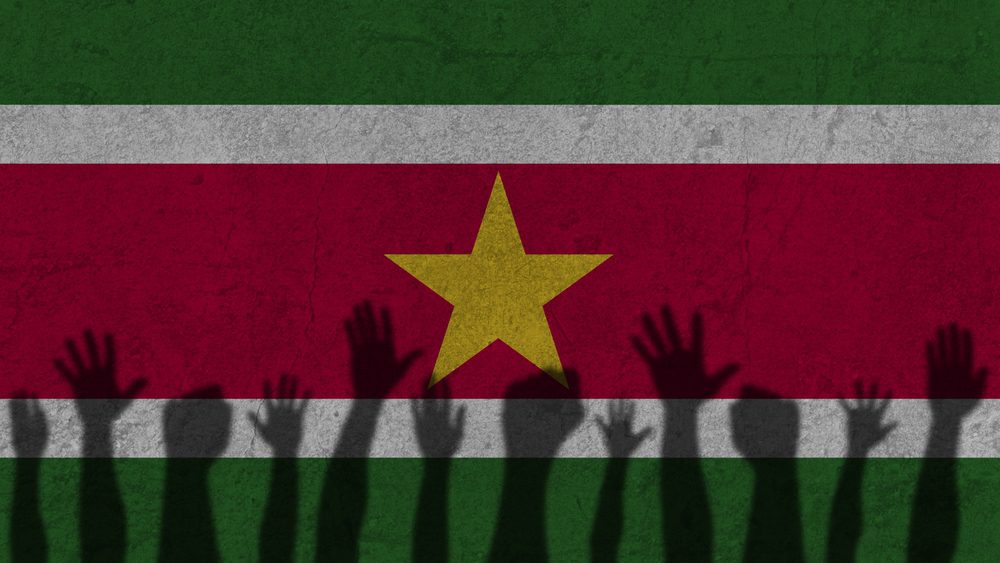A planned anti-austerity protest in the former Dutch colony of Suriname degenerated into rioting on Friday, February 17th. In response to the rioting, which included the storming of the parliament building, the government instituted a 12-hour curfew, from 6 p.m. to 6 a.m., to be in force indefinitely.
At Suriname’s parliament, the National Assembly, protesters threw bottles and stones, demanding that politicians come out to hear their grievances, including concerns about the country’s skyrocketing inflation. Among the thousands who had shown up, dozens ignored warning shots and tear gas fired by police and forced their way into the building. Protestors reportedly vandalized the building’s lobby and smashed several windows.
Eerst de Verenigde Staten (2021), toen Irak (2022) en Brazilië (2023), en vandaag ook #Suriname.
— Ruben Brekelmans (@rubenbrekelmans) February 17, 2023
Steeds vaker bestormen en vernielen demonstranten het #parlement.
Een zorgelijke ontwikkeling voor de #democratie… pic.twitter.com/xElPZjrChe
Meanwhile, throughout the capital, hundreds more clashed with police. Amid the chaos, multiple fires were started while shops and gas stations were looted, many of which were shuttered as a precaution.
SURINAME — Looting and violence amid the chaos after anti-government protesters stormed Suriname's parliament pic.twitter.com/e85TtV7yPV
— Citizen Free Press (@CitizenFreePres) February 18, 2023
In a televised speech Friday night, President Chan Santokhi said that there had been “incidents” in several neighborhoods and districts and that police and military had been deployed and had arrested over 50, a number that is expected to grow.
Santokhi, a former police chief and former justice minister, stated that his government would set up a task force to track down those responsible for attacking parliament. In the speech, citizens were also urged to avoid downtown and busy locations.
The preannounced protest had been partly organized by labor unions and activist Stephano ‘Pakittow’ Biervliet. On Saturday, Biervliet released a statement to the media saying he had not been arrested nor had the police invited him for questioning.
He went on to say that he strongly disapproved of all criminal acts that had taken place—the storming of parliament included. According to Biervliet, these acts had been committed by people he “was not associated with.”
Dutch Foreign Minister Wopke Hoekstra (CDA)—with whose government the former Dutch colony maintains close ties—announced on Twitter that he finds the parliament’s storming “extremely disturbing.”
Buitengewoon verontrustende berichten over binnendringers in het Surinaamse parlement. Nederland staat schouder aan schouder met Suriname als het gaat om het hooghouden van democratische waarden en de rechtsstaat.
— Wopke Hoekstra (@WBHoekstra) February 17, 2023
“The Netherlands stands shoulder to shoulder with Suriname when it comes to upholding democratic values and the rule of law,” he wrote.
The UN, meanwhile, expressed concern about the situation and called for “inclusive dialogue” between all parties.
The protest comes in the same week that the smallest party in government left the ruling coalition over differing opinions on social policies.
A failing economy, coupled with mammoth inflation numbers (over 54% at the end of 2022, according to the country’s central bank), has been plaguing Santokhi’s cabinet.
With his country facing real economic turmoil, Santokhi sought refuge with the International Monetary Fund (IMF), which pledged loans, but required Suriname to get its public finances in order first. A downsizing of its large number of government workers, an obvious money saver, is however going at a snail’s pace. The IMF penalized the country for this and opted not to disburse several portions of the promised financial support.
In addition, several reforms which directly increase the cost of living are being rushed through simultaneously. In January this year, VAT was introduced for the first time, except for basic necessities. Concurrently, the government is gradually phasing out fuel subsidies. Given that no comprehensive public transportation network exists in Suriname, forcing consumers to rely on private transport, this measure has proved wildly unpopular.
President Santokhi, who three years before had campaigned on fixing Suriname’s economic crisis, has been under pressure to resign. Last summer, demonstrators took to the streets for several weeks, prompting Santokhi to try and restore peace by making several pledges.
To maintain his power, this year he relied on the “threat to democracy” line, stressing that the rule of law and Suriname’s democratic institutions are in peril—no doubt inspired by government reactions to similar events, as recently observed in the U.S. and Brazil.






